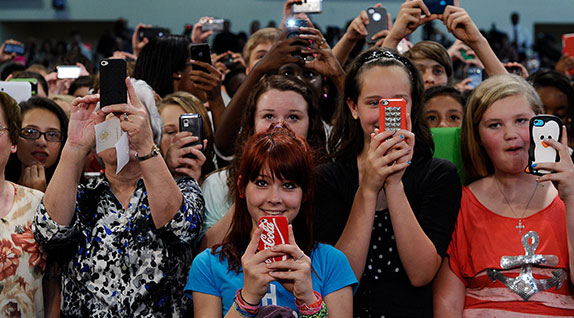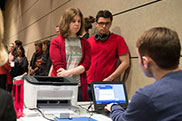 Jewel Samad/AFP/Getty Images
Jewel Samad/AFP/Getty Images
iGeneration: Middle school students use smartphones during a visit by U.S. President Obama in Mooresville, North Carolina (June 6, 2013).
Having grown up in an internet-connected world—which promotes tolerance, acceptance and self-expression—the latest generation has proven difficult to pin down.
Subscribe to the Real Truth for FREE news and analysis.
Subscribe NowShortly after the U.S. presidential election, a caller to a popular radio talk show presented a problem she was grappling with in her home. The single mother was rearing three young people, the oldest of whom was 24 years and the other two were teenagers. The woman described her problem of having to explain to “these Millennials” (her words) the validity of the electoral college in selecting candidates to the seat of the U.S. president.
Feeling disgruntled, alarmed and even frightened by the results of the recent presidential race, college students and high schoolers like hers had emotional meltdowns. Youth throughout America protested the outcome of a well-established, yet to them foreign, electoral system.
The popular assumption, as the caller revealed, is that people in their 20s and younger are all Millennials. This is partially true. Millennials are typically classified as those who are now in their mid- to late-20s and 30s who brought in the new century.
As Millennials emerged, their generation was blamed for many ills. They were labeled spoiled brats living in a fantasy world of no losers, where everyone earns a trophy merely for showing up. The adverse reaction to the outcome of the recent presidential campaign seems to support this. While these dissenters were indeed comprised of Millennials, another group was mixed in—Generation Z. This post-Millennial group is today’s teens, the oldest of whom have now entered adulthood.
 Michael B. Thomas/AFP/Getty Images
Michael B. Thomas/AFP/Getty Images
Generation Z, born after 1996, is coming of age and gaining distinction. Older generations such as Baby Boomers and Generation Xers think Gen Zers are simply teenage versions of their Millennial counterparts. Increasing evidence, however, is showing them to be quite different. The convenient assumption—that this latest generation can simply be pegged as lazy, unmotivated, entitled, privileged, spoiled, unwilling to “pay their dues” for their career path to success, and unteachable—does not fit.
More than any previous generation, this emerging group is truly the internet generation—this technology having been available their entire existence. Exposure to a worldwide web of facts, figures and opinions has shaped their outlook and perspective.
Social media and other forms of digital communication allow for a staggering flow of ideas and thoughts. The assortment of attitudes and viewpoints that now bombard young minds is near limitless in size and scope. Peer pressure is no longer confined to a given schoolyard or neighborhood. The sphere of influence is now global—allowing Gen Zers to find a fit anywhere within a tsunami of views and perspectives.
This reality makes the task for market researchers and demographic experts, whose job is to identify and label groups within populations, that much more difficult. How do you effectively brand a group for whom being different is not only okay, but encouraged? Steeped in the ideals of diversity and extreme tolerance, Generation Z appears to be a living embodiment of the “do your own thing” philosophy.
Each generation—from Baby Boomers to Generation X, followed by Millennials and now Generation Z—begins in a messy mixture of the previous one. It is thus easier to identify generations by their unique behavior instead of simply counting in 20-year increments.
 Ryan McBride/AFP/Getty Images
Ryan McBride/AFP/Getty Images
Generational behavior and perspective is typically shaped by the world events of the time. Baby Boomers, for instance, experienced the assassinations of high-profile leaders such as John F. Kennedy and Martin Luther King, Jr., as well as the political corruption of Watergate. Gen Xers saw the Berlin Wall collapse, quickly followed by the demise of the Soviet Union, officially ending the Cold War. Millennials saw the advent of the internet, the tragic events of 9/11, and the tough economic times of the late-2000s and early 2010s.
For Gen Zers, these significant events are nothing more than history—in some cases ancient history! Nonetheless, the results of these past events—distrust of government, globalism, advanced technology, hyper-security and fear of terrorism, as well as financial concerns—are their norm.
In a recent Inc. article titled “Gen Z Is Anxious, Distrustful, and Often Downright Miserable,” the amalgamation of these viewpoints became clear. Members from Generation Z were surveyed and it was revealed that they:
Having seen their parents endure economic difficulties, a nation at war, terrorism and the perils of technology (e.g., cyberbullying), Zers appear more hardened to life than the generation who came before them.
In today’s post-9/11 world, most of Generation Z cannot remember flying on a commercial airline without undergoing strict security checks. Tragedies such as the Boston Marathon bombings, the Orlando nightclub shooting, the attacks in Paris, and other acts of terrorism have presented a world filled with violence and mayhem. This generation routinely witnesses, through the internet, dead bodies lying in the streets. Such events and images alter a young person’s psyche.
Also, Generation Z possesses digital know-how. They seamlessly maneuver laptop computers, tablets, smartphones, social media, etc. Because of this heavy exposure to technology, they are skilled in accessing information very quickly and getting results immediately—if not yesterday. While beneficial, this also has consequences.
Zers are said to possess a goldfish-like, eight-second attention span. They expect short, frequent conversations, instead of long, drawn out interactions. Long one-on-one discussions on any one topic are generally boring for them. It is reported that as much as 11 percent of Generation Z has been diagnosed with attention deficit hyperactivity disorder (ADHD), having spent up to 27 percent of their time staring into screens (leading to the label screen-agers).
They are also exposed to the best and the worst of what the internet offers. Information is a click or a swipe away. Whether shopping online or “sexting,” their young minds are free to travel every virtual marketplace, corner, alley and confidential rendezvous the internet provides.
The result is palpable pessimism and a negative mindset, which can lead to discouragement and depression.
Marketers and business forecasters seeking success and profitability in the next decade or so know that they must tap into Generation Z—a group that currently makes up 18 percent of the population and will soon comprise the largest portion of the buying market.
This is easier said than done.
A New York Times article, “How to Spot a Member of Generation Z,” cited a report called “Meet the Centennials,” released by global marketing firm Futures Company. The news outlet reported that just “47 percent of the youths…surveyed (ages 12 to 17) say they ‘care a lot about whether their clothes are in style,’ compared to 65 percent of millennials surveyed in 1999.’”
Quoting a Futures Company director, the article continued, “Young people feel much more emboldened to express their own sense of style rather than mimicking a peer-accepted uniform or dress code compared to previous generations.”
This “you do you” approach is making the group nearly impossible to pin down. Experts are feverishly throwing names at the varied clothing styles in an attempt to stay ahead of the curve. Names such as “gender neutral” (a trend that rejects traditional gender-based clothing), “neo-rave” (a throwback to the rave-party look of the 1990s), “rocker redux” (a punk rocker style with plaid shirts, leather jackets, and dyed hair), and “normcore” (best described as the “laundry-day look” with oversized sweaters, baseball caps, and jogging pants) represent their best efforts.
The current generation of young people continues to prove they are notably different from their predecessors.
Generation Z seems more practical and pragmatic especially concerning their life goals. They have seen parents lose their jobs, homes and cars during the 2008 recession. Because of this, there are signs that they are more fiscally conservative than their predecessors. They are “really laser-focused on the financial consequences of their decisions” said a researcher from the financial firm Goldman Sachs (The Atlantic).
With a disdain for being identified as Millennials, these future leaders are now entering colleges and universities. They are distinguished by their entrepreneurial spirit, exposure to higher education, desire to communicate early and often, and hardworking drive.
According to the consulting firm Millennial Branding, 72 percent of high school students want to start a business one day (compared to 64 percent of college students). Sixty-one percent of high schoolers want to be an entrepreneur (compared to 43 percent of college students). While one-in-three Millennials and one-in-four Gen Xers are university educated, one-in-two Gen Zers—half—are expected to attend college.
With 10,000 Baby Boomers reaching retirement age every day, employers want to attract, engage and retain the best and brightest of Generation Z. The staffing organization Randstad asked Generation X and Baby Boomer employers what they expected Gen Z to want from the workplace. They assumed that Generation Z would want to work from home, maintain contact via email and text, and be motivated by making money. Some even assumed they would be lazy, entitled and detached from the “real world.”
But Randstad’s study of 16- to 20-year-olds revealed something much different. They said:
While it may be too soon to determine how entrenched this mindset is in Generation Z as a whole, it is a sign of a shift.
Generation Z is showing evidence of being more altruistic than anticipated. Ninety-two percent in the Inc. survey believe that helping others is important and 70 percent say inequality worries them greatly—almost certainly a result of coming of age in a time when tolerance is being universally promoted and championed. This reaction to prejudices and injustices has in many ways defined them.
The push for tolerance and acceptance at all costs has changed longstanding societal norms. Gen Zers have been exposed to terms such as cisgender, transgender, bigender, gender fluid, gender dysphoria, binary, nonbinary and pansexual, among others. Political correctness and the extremes of avoiding offensiveness has morphed their world into one filled with “safe spaces,” where they are protected from “trigger warnings” and where coloring books are a path to stress relief.
Clearly, Generation Z is a mixed bag. These future leaders possess characteristics that inspire confidence due to their practicality and pragmatism. Yet given their rising level of depression, anxiety and lack of patience, there is cause for concern.
This hybrid mindset seems to be yielding a more conservative generation than those of recent history. Some speculate Generation Z will be the most conservative since World War II. Studies are also predicting that Generation Z will attend church more regularly. One wonders if this is a result of exposure to so much negativity in the world, thus pushing them to search for answers to life’s problems.
Mankind has always to some degree looked to a “higher power” or a force outside themselves to understand their ultimate purpose.
From the beginning, God built a desire in man to seek Him. Yet with this natural desire He also presented man the power to choose. God did not want to create beings that would serve Him because they were simply programmed to do so—similar to instincts in animals. He wanted beings who would choose His way of life.
The ultimate manifestation of this choice were the two trees placed in the Garden of Eden. Concerning these two trees, God gave the first man and woman, Adam and Eve, plain instructions: “And out of the ground made the Lord God to grow every tree that is pleasant to the sight, and good for food; the tree of life also in the midst of the garden, and the tree of knowledge of good and evil…Of every tree of the garden you may freely eat: but of the tree of the knowledge of good and evil, you shall not eat of it: for in the day that you eat thereof you shall surely die” (Gen. 2:9, 16-17).
The two trees represented two distinct ways of life. Eating from the Tree of Life symbolized consciously choosing to follow God’s will, allowing Him to determine how we as human beings should live. Eating from the tree of the knowledge of good and evil represented man attempting to figure things out on his own without help and guidance from God.
Notice that God called this second tree “the tree of the knowledge of good and evil.”
The fruit of this tree is a mixture. There are good, well-meaning, perhaps even noble parts mixed with bad, malicious, corrupt parts. When man decides for himself what is right and what is wrong, the results vary greatly: including everything from incredible success to terrible failure.
Man naturally relies upon the five basic physical senses—sight, sound, touch, smell, taste—to identify and analyze the world around him. Yet we were also born with a spiritual element that allows us to have superior intellect over animals: “For what man knows the things of a man, save the spirit of man which is in him?” (I Cor. 2:11).
Human beings possess this “spirit in man,” which enables us to reason and comprehend the physical matters of our world.
But God’s Word reveals that man was made spiritually incomplete. He needs another spirit—God’s Spirit. Without the Holy Spirit or the Spirit of God working within our minds, converting our thinking, guiding our behavior so that we make life decisions according to our Creator’s will, we are incomplete. In this state, we will continue to fall far short of solving the world’s problems and attaining our awesome human potential.
Anyone with eyes can see the ills of our world. Generation Z is the latest to try tackling what is just ahead. Yes, they are well-informed, socially aware, pragmatic in decision-making, and entrepreneurial—yet at the same time they are depressed, cynical, distrustful and impatient. They see the confusion and selfishness in the world, but are near powerless to make any real impact.
This latest generation is a microcosm of what mankind has endured over the thousands of years it has been on Earth. After millennia of developing their own societies, generations of men and women have eaten from the same tree of the knowledge of good and evil from which Adam and Eve ate. The consequences of their decisions echo through today’s generation.
But with guidance things can be different. Instead of choosing a mixture of good and bad, man can choose the pure fruit of the Tree of Life.
As in the Garden of Eden, it begins with a choice. God has an objective for mankind—a purpose for every human being. He does not intend for the world to be as we see it today. He has something much different in mind.
To learn more about what God wants for your future and the future of Generation Z, read the life-changing book, The Awesome Potential of Man. It reveals the amazing truth of the life God wants you to live.